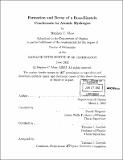Formation and decay of a Bose-Einstein condensate in atomic hydrogen
Author(s)
Moss, Stephen C. (Stephen Calvin), 1974-
DownloadFull printable version (16.81Mb)
Other Contributors
Massachusetts Institute of Technology. Dept. of Physics.
Advisor
Daniel Kleppner and Thomas J. Greytak.
Terms of use
Metadata
Show full item recordAbstract
The formation and decay of a Bose-Einstein condensate (BEC) in atomic hydrogen is studied. Magnetically trapped hydrogen atoms were evaporatively cooled close to the onset of Bose-Einstein condensation and then suddenly quenched below the transition temperature. The subsequent condensate formation and decay were observed using time-resolved laser spectroscopy of the two-photon S - 2S transition. Theory is developed to quantitatively describe the formation and decay of the condensate using a modified version of the time-dependent theory developed previously by Bijlsma, Zaremba and Stoof [Phys. Rev. A 62, 063609 (2000)]. The modifications consist of properly including dipolar spin-relaxation processes that occur in a doubly spin-polarized atomic gas and the experimental evaporative cooling procedure used to quench the gas below the critical temperature. The modifications are essential for understanding the hydrogen condensate formation experiments, and our simulations are in good quantitative agreement with experiment. In our comparison between theory and experiment, we find that a condensate of atomic hydrogen has the same collisional frequency shift of the two-photon IS-2S resonance as a noncondensed gas at the same density. This finding contradicts theoretical predictions of the collisional shift for trapped samples with a homogeneous density. We suggest that elastic collisions occuring during the laser excitation process destroy correlations between the excited 2S atom and the IS background, leading to a collisional frequency shift for the noncondensed gas half as large as predicted.
Description
Thesis (Ph.D.)--Massachusetts Institute of Technology, Dept. of Physics, 2002. Includes bibliographical references (p. 251-264).
Date issued
2002Department
Massachusetts Institute of Technology. Department of PhysicsPublisher
Massachusetts Institute of Technology
Keywords
Physics.